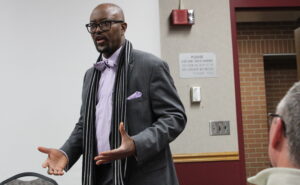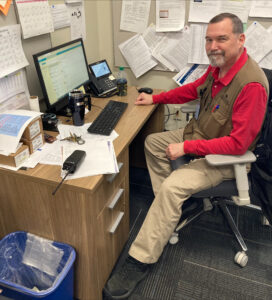Editor’s note: This story was updated on June 8 to remove the inaccurate statement that Scott Behrens, vice president of Enrollment Management and Student Success, was unavailable by deadline. There was a scheduled meeting with Behrens for Friday, June 9. A text seeking comment from Behrens was not sent in a timely fashion on Thursday. This version also specifies the recipients of Charlie Abel’s email.
MCCC President Kojo Quartey’s response to the April 9 bomb threat to the college has been called into question—by MCCC’s former chief of Security Services, Charlie Abel.
On Thursday, May 25 Quartey sent an email to 1-ALLMCCCE-Mail users outlining his response in 11 points defending his actions to what turned out to be a “hoax.”
Abel refuted many of the 11 points that were included in Quartey’s campus-wide message in an email he sent to the MCCC Faculty Association, support staff union and maintenance union on June 1.

Abel was set to retire this year, saying he planned to stay on in limited capacity, prior to the April 9 incident. He said his plan was to help the security team to ensure a smooth transition, but decided to resign shortly after the bomb threat. Abel said he and his office were not utilized properly and to their capabilities.
“I don’t know why we were intentionally left out of the matter,” Abel said. “Had I been contacted, there are a lot of procedures we could have gone through.”
Quartey’s email stated that once he learned of the threat, he called Scott Behrens, vice president of Enrollment Management and Student Success, and then called 911.
Abel said he agreed with Quartey’s initial response to dial 911, and said he never needed to be the first one called, but should have been notified next so that he could have put his office’s capabilities to work.
Abel said if he had been notified, he could have remotely determined if anyone was on campus and further helped direct those who may have been on campus to safety. Abel said he could have also unlocked campus doors remotely, keeping personnel safe while helping law enforcement.
“In my personal opinion he’s never taken campus security serious or my office,” he said. “Kojo does not need to know everything that needs to be done. He just needs to use the resources he has.”
Abel said safety was his main concern and believes that law enforcement would not have been able to properly “sweep” the entire campus in the time that it took them to complete the sweep.
“You cannot sweep all buildings in three hours, it’s not possible,” he said. “It takes security two or two-and-a-half hours just to check all of the campus’ external doors.”
In Quartey’s email to the campus, he said that Abel’s security office phone was inaccessible because the campus was closed for the Easter Holiday.

“He just told everyone in the college he doesn’t know how to get ahold of his chief of security,” Abel said.
It is an issue that has since been resolved Quartey said, adding the new chief of security has set the system up to re-direct to an available person during hours when no one is on campus and that the two of them tested the system successfully over the recent Memorial Day break.
Quartey said he did the right thing by notifying 911.
“We responded the way we were supposed to and the sheriff ensured me we did the right thing—the chief law enforcement officer of the entire county ensured me that night we did the right,” Quartey said. “I did what I had to do to ensure this campus was safe.”
Quartey said nobody could have anticipated such a threat on a holiday in the middle of the night likening the event to the initial outbreak of COVID.
“We had an incident that no one had anticipated, very similar to COVID, so what do you do? You scramble to try to ensure safety and the first order of business is to call the experts,” he said. “Off campus, bomb threat, I called 911 as the sheriff said I should have.”
Mark Bergmooser, assistant professor of Communication, said he addressed the board at the May 22 Board of Trustees meeting regarding Quartey’s response.
“It was grossly mishandled based on the information I received from speaking to various security personnel. I encouraged the board not to take my word for it but to investigate the matter themselves and speak to the other employee groups,” he said. “I mentioned the vote of no confidence and how to my knowledge none of the [Board of Trustees] members spoke to any of the employee groups regarding the matter.”
In Abel’s email, he said he believes that the vote of no confidence was “spot on,” due to Quartey’s lack of communication with the security office.
Quartey there was no connection between the vote of no confidence from the January 23 Board of Trustees meeting and his actions during the bomb threat.
Quartey said the vote of no confidence was over contract negotiations and has no bearing on this incident, saying it was rather just a personal jab from Abel.
Abel concludes his email by saying the Board of Trustees members’ contact information is not listed on the campus website, questioning if the administration intentionally does this to protect themselves by keeping the board in the dark on issues such as the April 9 incident.
Bergmooser said he agrees with Abel’s sentiment.
“It’s almost like the administration wants to control the means of communication,” he said. “They are elected officials in the United States of America shouldn’t you be able to contact elected officials? This is a community college.”
Bergmooser said he also finds an issue with the public’s ability to communicate with the board at meetings, saying the terminology used such as “roll call designation,” which is the opportunity for the public to speak at meetings, can be confusing to the average person.
“We have a Board of Trustees that we can’t communicate with easily at board meetings or through contact information,” he said.
Quartey said he rejects the accusations regarding the lack of contact information. He said the Board of Trustees is a policy board which is why their contact information is not publicly available.
Quartey said now is not the time to cast blame, but rather take comfort in the issues that have been resolved as a result of the incident.
“This is not the time to be casting aspersion or apportioning blame. We worked with law enforcement to resolve the issue to ensure the safety of our campus. We have learned from this and made the appropriate changes to ensure that we are better prepared in the future,” he said.
The incident of April 9 is still under investigation by local law enforcement Quartey said.
Monroe County Sheriff Troy Goodnough said, “from our perspective, the situation was handled correctly by Dr. Quartey.”

